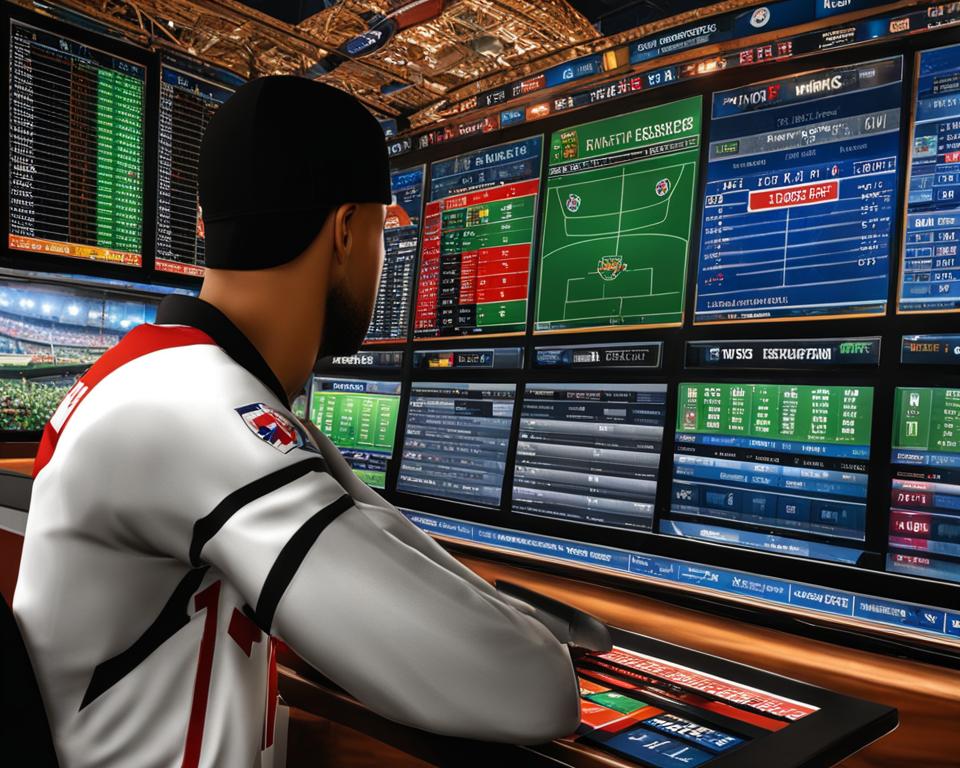Welcome to the beginner’s guide to sportsbook handicapping! If you are new to the world of sports betting and looking to improve your chances of winning, you’ve come to the right place. Sportsbook handicapping is the process of analyzing and predicting the outcome of sporting events in order to make informed bets. In this guide, we will provide you with essential strategies and tips to get started on your handicapping journey.
Key Takeaways
- Sportsbook handicapping involves analyzing and predicting the outcome of sporting events to make informed bets.
- Understanding the different types of bettors, such as sharps and squares, is crucial for novice handicappers.
- Level one handicapping focuses on basic principles like evaluating injuries, considering home-field advantage, and taking weather conditions into account.
- Level two handicapping involves measuring intangibles such as team motivation, travel schedules, and potential trap games.
- While professional handicappers can provide expert analysis, it’s important to exercise caution and do thorough research before relying on their picks.
Understanding the Different Types of Bettors
In the world of sports betting, novices need to familiarize themselves with the two main types of bettors – the “sharps” and the “squares.” By understanding the characteristics and approaches of these two groups, novice sports handicappers can develop effective sports betting strategies.
Sharps
Sharps are professional bettors who dedicate their time to studying and analyzing sports events. They rely on statistical analysis, historical data, and comprehensive research to make informed bets. Sharps have deep knowledge of specific sports, teams, and players, allowing them to identify valuable betting opportunities that others might overlook.
“Sharps have a disciplined and methodical approach to sports betting, meticulously evaluating every aspect of a game to identify profitable betting options.”
Squares
Squares, on the other hand, are casual bettors who rely more on intuition and luck. They are often driven by fandom or personal bias, making emotionally-based decisions rather than relying on data and analysis. Squares might place bets based on popular opinion, team popularity, or personal beliefs, without thoroughly evaluating the odds or considering relevant factors.
“Squares are more likely to follow the crowd and bet on popular teams, resulting in less advantageous odds and potential missed opportunities.”
Understanding the difference between sharps and squares is crucial for novice sports handicappers. By embracing a sharp’s analytical mindset and utilizing data-driven strategies, beginners can increase their chances of making profitable bets. It is important to remember that sports betting is a skill that can be developed with time and experience, and adopting a sharps’ approach is one step toward becoming a successful sports bettor.
| Bettor Type | Characteristics | Approach |
|---|---|---|
| Sharps | Dedicated, knowledgeable, analytical | Data-driven, strategic |
| Squares | Casual, emotional, biased | Intuition, luck, popular opinion |
Level One Handicapping: Basic Principles
Level one handicapping is a fundamental approach that novice sports handicappers can adopt to improve their betting strategies. By considering these basic principles, bettors can make more informed decisions and increase their chances of success.
Evaluating Injuries and Inactive Players
One of the key factors to consider when handicapping a game is the injury status of players. Injuries can have a significant impact on a team’s performance and the outcome of a game. It is important to stay updated on the latest injury reports and assess the potential impact of injuries on the team’s overall performance.
Additionally, the absence of key players due to factors such as suspensions or personal reasons can also affect team dynamics and performance. Novice handicappers should take into account the impact of inactive players and adjust their assessments accordingly.
The Importance of Home Field Advantage
Another factor to consider when handicapping is the importance of home field advantage. Home teams often have a higher chance of winning due to the support of their fans and familiarity with the stadium. Novice handicappers should take into account the impact of home field advantage and consider it as a potential advantage for the home team.
Factoring in Weather Conditions
Weather conditions can significantly impact the outcome of outdoor sporting events, especially those played in outdoor stadiums. Factors such as rain, wind, or extreme temperatures can affect players’ performance and the overall flow of the game. Novice handicappers should check the weather forecast and consider how it might influence the outcome of the game.
“By considering injuries, home field advantage, and weather conditions, novice handicappers can gain valuable insights and make more informed decisions when placing their bets.”
By taking these basic principles into account, novice handicappers can develop a solid foundation for sportsbook handicapping. It is essential to conduct thorough research, analyze relevant data, and stay updated on the latest information to make well-informed betting decisions.
| Advantages of Level One Handicapping | Considerations |
|---|---|
| 1. Focuses on crucial factors impacting game outcomes | 1. Injuries may have varying degrees of impact on teams |
| 2. Provides a simple and accessible starting point for novice handicappers | 2. Home field advantage might vary in different sports and leagues |
| 3. Helps in mitigating potential risks associated with weather conditions | 3. Weather conditions can change unexpectedly |
Level Two Handicapping: Measuring Intangibles
Level two handicapping takes sportsbook handicapping to a deeper level by analyzing intangible factors that can significantly impact the outcome of a game. Novice bettors often overlook these factors, but they are key to making effective bets and improving overall success rates.
One important intangible factor to consider is the motivation of teams. Some teams may be playing with extra motivation due to factors such as rivalry games, revenge against a previous loss, or competing for a playoff spot. Understanding the psychological elements at play can give handicappers an edge in predicting how teams will perform.
Another aspect of level two handicapping is the analysis of travel schedules and byes. Teams that have to travel long distances or experience a challenging schedule with limited rest time may be more fatigued and perform poorly compared to teams with less taxing schedules. By keeping track of travel patterns and bye weeks, handicappers can identify potential advantages or disadvantages for each team.
Identifying trap games is another critical element of level two handicapping. A trap game is a match where a team might be overlooked or underestimated because they are facing a weaker opponent before a more challenging game. These matchups often lead to unexpected outcomes, which can present opportunities for bettors who are attentive to these potential traps.
| Key Factors in Level Two Handicapping | Description |
|---|---|
| Motivation of Teams | Consider the psychological factors that may impact team performance. |
| Travel Schedules and Byes | Analyze the impact of travel distances and rest periods on team performance. |
| Identifying Trap Games | Recognize games where a team might be underestimated due to an upcoming challenging matchup. |
By incorporating level two handicapping techniques into their strategies, novice bettors can gain a deeper understanding of the intricate factors that influence game outcomes. This comprehensive approach can lead to more informed bets and ultimately improve their overall success in sports betting.
The Role of Professional Handicappers
Professional handicappers play a significant role in the world of sports betting. These experts provide valuable analysis and predictions for sports events, helping novice bettors make more informed decisions. However, it’s essential for novices to approach the use of professional handicappers with caution and thorough research. Not all professional handicappers are equally reliable, and blindly relying on their picks can lead to subpar results.
“Not all professional handicappers are equally reliable.”
Before trusting a professional handicapper, novice bettors should perform their due diligence and evaluate the handicapper’s track record, reputation, and methodology. It’s crucial to look for handicappers who have a proven track record of success and a transparent approach to their analysis.
One way to assess the credibility of a professional handicapper is to review their past performance and accuracy of predictions. Look for handicappers who have consistently delivered accurate picks over time, as this indicates a higher level of expertise and reliability. Additionally, consider reading reviews and testimonials from other bettors who have used the services of the handicapper.
Understanding the Handicapper’s Methodology
“Look for handicappers who have a proven track record of success and a transparent approach to their analysis.”
It’s important to understand the handicapper’s methodology and the factors they consider when making their picks. Reliable professional handicappers should have a well-defined process for analyzing sports events and should be able to explain their reasoning behind each prediction.
“Reliable professional handicappers should have a well-defined process for analyzing sports events and should be able to explain their reasoning behind each prediction.”
Novice bettors should also evaluate the handicapper’s expertise in the specific sport or league they are interested in betting on. Different sports require different strategies and knowledge, so it’s important to find a handicapper who specializes in the sport you are interested in.
The Cost-Benefit Analysis
While professional handicappers can provide valuable insights, bettors should also consider the cost of using their services. Handicapper services often come at a price, and it’s essential to weigh the potential benefits against the costs.
“Handicapper services often come at a price, and it’s essential to weigh the potential benefits against the costs.”
Novice bettors should assess whether the potential increase in winning bets justifies the expense of using professional handicappers. It’s advisable to start with smaller bets and evaluate the impact of the handicapper’s predictions on your overall profitability before committing to long-term subscriptions or higher stakes.
To make an informed decision, it’s recommended to allocate a specific budget for using professional handicappers and track the results over time. This way, bettors can assess the cost-effectiveness of the handicapper’s services and make adjustments accordingly.
| Pros of Professional Handicappers | Cons of Professional Handicappers |
|---|---|
| Access to expert analysis and insights | Potential cost of using their services |
| Saves time and effort in researching | Varying levels of reliability and accuracy |
| Can help novice bettors make smarter decisions | Possibility of conflicting predictions |
| May provide access to exclusive information | May not align with personal betting preferences or strategies |
Overall, professional handicappers can be valuable resources for novice sports bettors. However, it’s important to exercise caution, conduct thorough research, and critically evaluate the reliability and cost-effectiveness of their services. By combining the insights of professional handicappers with personal analysis and strategy, novice bettors can make more informed and profitable bets.
Getting Started with Sports Betting Sites
Once novice bettors have familiarized themselves with the basics of sportsbook handicapping, they are ready to start placing bets. However, before jumping into the world of sports betting, it’s important to choose a reputable and safe sports betting site to ensure a secure and enjoyable betting experience. Here are the essential steps to get started:
- Do thorough research: Take the time to research different sports betting sites and apps. Look for platforms that have a strong reputation, valid licenses, and positive user reviews. It’s also helpful to consider factors such as available bonuses and promotions.
- Create an account: Once a suitable sports betting site has been identified, the next step is to create an account. This typically involves providing personal information, such as name, date of birth, and address. It’s important to choose a strong and unique password to protect the account.
- Deposit funds: After creating an account, novice bettors will need to deposit funds into their betting account. Most sports betting sites offer various payment methods, such as credit/debit cards, bank transfers, and e-wallets. Choose a secure and convenient option to fund the account.
Popular sports betting sites that cater to beginners include DraftKings, FanDuel, Caesars, and BetMGM. These platforms offer a user-friendly interface, a wide range of sports to bet on, and competitive odds. Novice bettors can choose the platform that best suits their preferences and start their sports betting journey.
“Choosing a reliable sports betting site is crucial for novice bettors. It sets the foundation for a safe and enjoyable betting experience. Take the time to research and compare different options before making a decision.”
Understanding Sports Betting Odds
Sports betting odds are a fundamental component of sportsbook handicapping. They represent the probability of a particular outcome occurring in a sporting event. Novice bettors must familiarize themselves with the different formats of odds and understand how to calculate potential winnings based on these odds.
Types of Betting Odds
There are three common formats for presenting odds:
- Decimal Odds: This format represents the potential return on a bet including the original stake. For example, if the odds are 2.50, a $10 bet would return $25. Novice bettors should be comfortable working with decimal odds as they are widely used in most parts of the world.
- Fractional Odds: Fractional odds are expressed as a ratio and indicate the potential profit relative to the stake. For example, 3/1 odds mean that a $1 bet would result in a $3 profit. Fractional odds are commonly used in the United Kingdom.
- American Odds: American odds are presented as either positive or negative numbers. Positive odds indicate the potential profit on a $100 bet, while negative odds indicate the amount that needs to be wagered to win $100. For example, +200 odds mean a $100 bet would result in a $200 profit, while -150 odds mean a $150 bet is required to win $100. American odds are primarily used in the United States.

Calculating Potential Winnings
Novice bettors should understand how to calculate potential winnings based on the odds. Here are some examples:
| Odds | Stake | Potential Profit | Total Return |
|---|---|---|---|
| 2.50 (decimal) | $10 | $15 | $25 |
| 3/1 (fractional) | $1 | $3 | $4 |
| +200 (American) | $100 | $200 | $300 |
Understanding and interpreting sports betting odds is essential for novice bettors to make informed decisions and maximize their potential winnings.
Live Sports Betting and In-Play Betting
Live sports betting, also known as in-play betting, is a dynamic and exciting form of sportsbook handicapping that allows bettors to place wagers on events that are already in progress. Unlike traditional pre-game betting, in-play betting offers the advantage of real-time odds and the ability to react to the changing dynamics of a game as it unfolds.
In-play betting opens up a new world of opportunities for novice bettors, providing them with a chance to analyze the momentum of a game, study player performance, and make informed decisions based on the current score and other factors. This form of betting allows bettors to take advantage of market inefficiencies and profit from their ability to read the game in real-time.
When engaging in in-play betting, it’s important for novice bettors to exercise caution and manage their risks effectively. The dynamic nature of live sports betting can lead to rapid changes in odds and available bets, requiring bettors to make quick decisions. It’s crucial to stay focused, analyze the game objectively, and resist the temptation to chase losses or make impulsive bets based on emotions.
“In-play betting offers a unique and thrilling experience for bettors, but it also presents challenges. Novice bettors should approach it with a strategic mindset and adhere to their pre-defined betting strategies.”
When making in-play bets, it’s advisable to start with smaller wagers until you become familiar with the process and gain confidence in your ability to make accurate assessments in real-time. Keeping track of the game statistics and paying attention to key moments can provide valuable insights that can inform your betting decisions. Additionally, being aware of the specific sport’s rules and regulations pertaining to live betting is essential to make well-informed choices.
Advantages and Challenges of Live Sports Betting
In-play betting offers several advantages:
- Opportunity to react to unfolding events and adjust bets accordingly
- Ability to take advantage of favorable odds created by game dynamics
- Increased excitement and engagement with the game
However, there are also challenges that come with live sports betting:
- Fast-paced nature of betting decisions
- Higher risk due to limited time for analysis
- Need for discipline and the ability to make rational decisions under pressure
“To succeed in in-play betting, novice bettors must strike a balance between quick decision-making and thoughtful analysis. It’s a skill that can be developed through experience and practice.”
| Advantages of Live Sports Betting | Challenges of Live Sports Betting |
|---|---|
| Opportunity to react to unfolding events and adjust bets accordingly | Fast-paced nature of betting decisions |
| Ability to take advantage of favorable odds created by game dynamics | Higher risk due to limited time for analysis |
| Increased excitement and engagement with the game | Need for discipline and the ability to make rational decisions under pressure |
The Role of Sportsbooks and How to Read Betting Lines
In the world of sports betting, a crucial player is the sportsbook. These are companies or platforms that accept wagers on various sporting events, providing a platform for bettors to place their bets. Sportsbooks play a vital role in the betting ecosystem, as they set the odds for each event and offer a wide range of sports and betting options.

Understanding how to read betting lines is essential for novice bettors looking to make informed bets. Betting lines provide valuable information about the odds and potential outcomes of a sporting event. By interpreting these betting lines, bettors can make informed decisions when placing their bets.
Types of Betting Lines
Betting lines come in different formats, and each format provides specific information. Novice bettors should familiarize themselves with the following types of betting lines:
- Money Line Odds: This is the simplest form of betting line, indicating the amount that needs to be wagered in order to win $100. Positive money line odds indicate the potential profit if $100 is wagered, while negative money line odds represent the amount that needs to be wagered to win $100.
- Point Spreads: Point spreads are commonly used in team-based sports such as football and basketball. They level the playing field by assigning a handicap to the favorite team and a head start to the underdog. Bettors can bet on whether a team will win by a specific number of points or keep the margin of victory within a particular range.
- Over/Under Bets: This type of bet, also known as the total bet, involves predicting whether the total combined score of a game will be over or under a specified amount set by the sportsbook.
By understanding these different types of betting lines, novice bettors can enhance their understanding of the odds and make more informed decisions when placing their bets.
“Understanding how to read betting lines is crucial for novice bettors. It allows them to navigate the sports betting landscape and make informed decisions when placing their bets.”
Comparing Different Betting Lines
| Betting Line | Description | Example |
|---|---|---|
| Money Line Odds | Indicates the amount needed to wager for a $100 profit or the amount won for a $100 wager. | -150 |
| Point Spreads | Assigns a handicap to the favorite team and a head start to the underdog to level the playing field. | -3.5 |
| Over/Under Bets | Predicts whether the total combined score of a game will be over or under a specified amount. | 45.5 |
Table: Comparing different types of betting lines in sportsbook handicapping
By understanding the role of sportsbooks and how to read betting lines, novice bettors can navigate the world of sports betting more effectively. This knowledge equips them with the necessary tools to make informed decisions and increase their chances of success.
The Pitfalls of Professional Handicappers
While novice sports bettors may seek guidance from professional handicappers, it is important to approach their picks with caution and take into account the potential pitfalls involved. Although there are reputable handicappers who provide valuable insights, it is necessary to exercise discernment and consider the following factors:
Limited Transparency
Some handicappers may manipulate their statistics to present a misleadingly positive track record. They may selectively highlight successful predictions while excluding unsuccessful ones, creating a deceptive image of their success rate. As a novice bettor, it is crucial to thoroughly research the handicapper’s background, customer reviews, and overall reputation to ensure transparency and credibility.
Divergent Odds
Novice bettors should be aware that they may not receive the same betting odds as the professional handicapper. Variances in odds can occur due to timing, location, or individual sportsbooks. It is essential to understand that even if the handicapper’s pick is accurate, the odds available to novice bettors may result in diminished value, affecting potential winnings.
Novice bettors should always exercise their own judgment and conduct comprehensive analysis, using professional handicappers’ picks as one of many data points to inform their decisions.
To illustrate the potential drawbacks of relying solely on professional handicappers, consider the following hypothetical scenario:
| Handicapper Pick | Handicapper Odds | Actual Odds | Outcome |
|---|---|---|---|
| Dallas Cowboys to win | -150 | -130 | Loss |
| New York Giants to cover the spread | +7.5 | +6.5 | Win |
| Total Points Under 45 | -110 | -120 | Win |
This table demonstrates how a novice bettor, depending solely on the handicapper’s picks, may experience mixed results due to divergent odds. While the handicapper’s win rate might be satisfactory, the actual outcome may differ due to discrepancies in odds. It emphasizes the importance of independently considering odds and conducting meticulous research before making betting decisions.
Novice sports bettors should view professional handicapper picks as one of many resources and make decisions based on their own analysis and judgment. By understanding the limitations and potential pitfalls associated with professional handicappers, bettors can avoid relying solely on external advice and develop their own strategies for long-term success.
The Costs and Risks of Handicapper Services
When it comes to sportsbook handicapping, novice bettors may consider seeking the assistance of professional handicapper services. While these services can offer valuable insights and predictions, it’s crucial for beginners to carefully weigh the costs and risks involved.
Professional handicapper services often come with a price tag. Subscribing to these services can be expensive, with fees ranging from weekly or monthly subscriptions to premium packages. Novice bettors should consider their budget and the potential return on investment before committing to a handicapper service.
It’s important to understand that even with the assistance of professional handicappers, sports betting is inherently risky. There are no guarantees of success, and bettors should be prepared to accept losses. Novice bettors should be cautious of services that promise surefire wins or unrealistic success rates.
Additionally, it’s critical for novice bettors to exercise due diligence when selecting a handicapper service. Research the reputation and track record of the handicapper, read reviews from other bettors, and take the time to understand their methodology and approach. Remember, not all handicappers are equally reliable, and some may even manipulate their statistics to appear more successful than they actually are.
Ultimately, the decision to utilize handicapper services is a personal one. While they can provide valuable insights and save time on analysis, it’s essential for novice bettors to develop their own knowledge and strategies. Relying solely on handicappers may hinder the development of crucial skills and understanding of sportsbook handicapping.
Pros and Cons of Handicapper Services
| Pros | Cons |
|---|---|
| – Access to expert analysis and predictions | – Costs can be high and impact the overall betting budget |
| – Saved time on detailed analysis and research | – No guarantees of success, as sports betting is inherently risky |
| – Opportunity to learn from experienced handicappers | – Some handicappers may manipulate statistics to appear more successful |
Novice bettors should carefully evaluate the benefits and drawbacks before deciding to utilize handicapper services. It’s crucial to strike a balance between relying on experts and developing one’s own skills and understanding of sportsbook handicapping.
Conclusion
Sportsbook handicapping can be a complex but rewarding endeavor for novice bettors. By understanding the basic principles of sportsbook handicapping and considering intangible factors, such as motivation and travel schedules, bettors can improve their chances of making successful bets. Staying informed about injuries, home field advantage, and weather conditions is essential to making informed decisions.
Approach sports betting with caution and conduct thorough research before placing any bets. Develop your own strategies based on sound analysis rather than relying solely on professional handicappers. While they can provide valuable insights, it’s important to exercise caution and evaluate their credibility before making any decisions based on their picks.
Remember, there are no guarantees in sports betting, and it’s essential to understand the risks involved. Always bet responsibly and within your means. With dedication, knowledge, and a thoughtful approach, you can navigate the world of sportsbook handicapping and increase your chances of enjoying success in your betting endeavors.
FAQ
What is sportsbook handicapping?
Sportsbook handicapping is the process of analyzing and predicting the outcome of sporting events in order to make informed bets.
What are the two main types of bettors in sports betting?
The two main types of bettors in sports betting are “sharps” and “squares.” Sharps are professional bettors who dedicate their time to studying and analyzing sports events, while squares are casual bettors who rely more on intuition and luck.
What is level one handicapping?
Level one handicapping involves considering basic principles that can greatly impact the outcome of a game, such as evaluating injuries and inactive players, understanding the importance of home field advantage, and factoring in weather conditions.
What is level two handicapping?
Level two handicapping focuses on measuring intangible factors that can influence the outcome of a game, such as considering the motivation of teams, analyzing travel schedules and byes, and identifying potential trap games.
What are professional handicappers?
Professional handicappers are individuals who provide expert analysis and predictions for sports events. It’s important for novice bettors to exercise caution and do thorough research before relying on their picks.
How do I get started with sports betting?
To start placing bets, novice bettors need to choose a reputable and safe sports betting site, create an account, and deposit funds. Popular sports betting sites include DraftKings, FanDuel, Caesars, and BetMGM.
What are sports betting odds?
Sports betting odds represent the probability of a particular outcome occurring in a sporting event. Novice bettors should familiarize themselves with different formats of odds (decimal, fractional, and American) and how to calculate potential winnings based on the odds.
What is live sports betting?
Live sports betting, also known as in-play betting, allows bettors to place wagers on events that are already in progress. The odds and available bets change in real-time based on the current score and other factors.
What are sportsbooks?
Sportsbooks are companies or platforms that accept wagers on sporting events. They set the odds for each event and offer a wide range of sports and betting options. Novice bettors need to understand how to read betting lines, including money line odds, point spreads, and over/under bets.
Should I rely on professional handicapper picks?
While there are reputable professional handicappers, novice bettors should be cautious and do their own research. Some handicappers may manipulate their stats, and bettors may not always get the same odds as the handicapper, resulting in decreased value.
Are professional handicapper services worth the cost?
Professional handicapper services often come with high costs, and novice bettors should carefully consider the potential return on investment before subscribing. It’s important to weigh the costs against the possibility of winning bets and be aware that sports betting carries risk.





